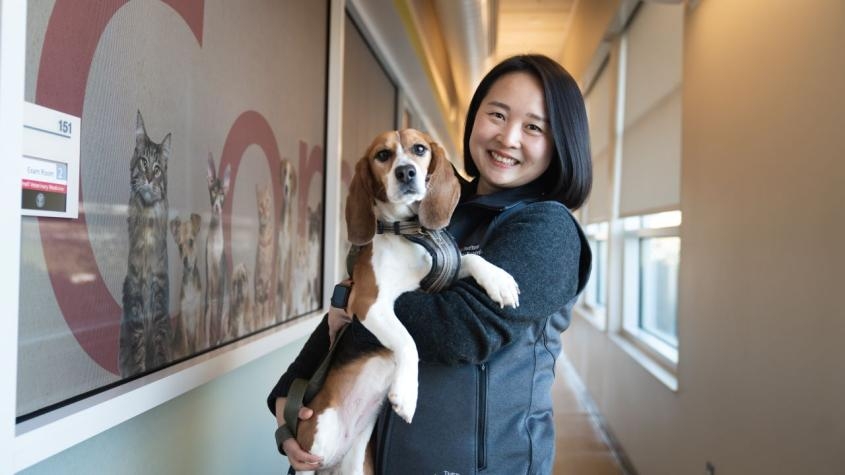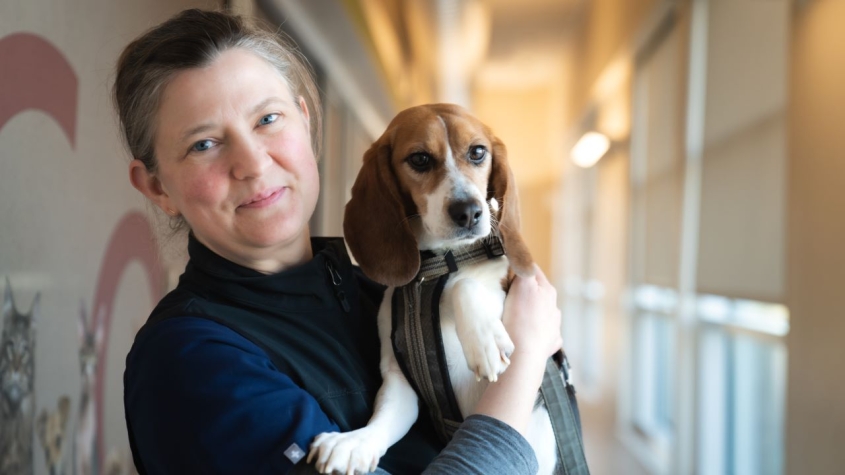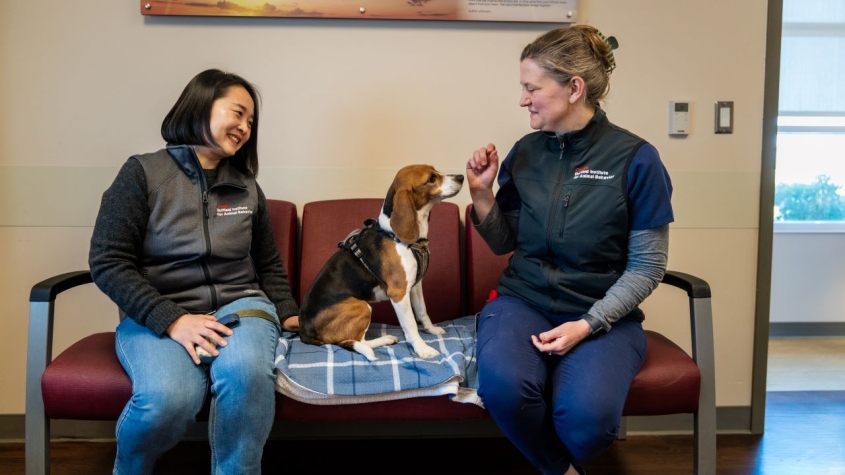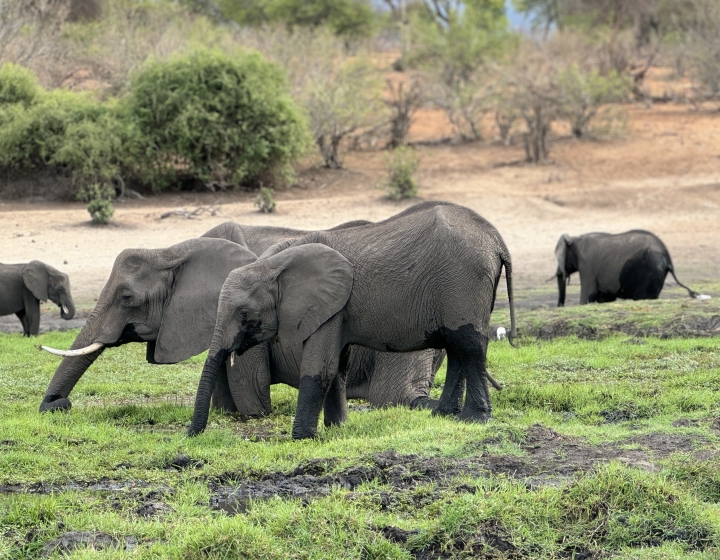Cornell's Duffield Institute takes big steps forward to understand animal behavior
The Duffield Institute for Animal Behavior at Cornell’s College of Veterinary Medicine (CVM) is making big strides in understanding animal behavior and improving the lives of pets and people who care for them. With the recent arrival of Dr. Sun Kim, the newly appointed Dave and Cheryl Duffield Professor, the institute’s core team is complete and advancing or launching a variety of research and teaching programs.
The Duffield Institute was established in 2022 with the support of a $12.1 million grant from the Dave & Cheryl Duffield Foundation, a private charitable foundation created by Cornell engineer and entrepreneur Dave Duffield ’62, M.B.A. ’64, and his wife Cheryl. The grant supports the college’s leadership in teaching, research and clinical practice in ways previously not possible.
“If we’re not treating the mental health of our companion animals, we’re not really taking care of all their health issues,” says David Lee ’88, D.V.M. ’94, M.B.A. ’99, associate dean for external programs. In fact, behavior problems continue to be the primary reason why animals are relinquished to shelters or euthanized. Yet only around 100 veterinarians are board certified through the American College of Veterinary Behaviorists (ACVB), including some in other countries. “Very few schools are training specialists in this area, and Cornell will play a leadership role in developing the next generation of veterinary behaviorists,” Lee says.
Behavior: nurturing the human-animal bond
Today, with three veterinary behaviorists and four behavioral genetics faculty, the Duffield Institute combines Cornell’s long-standing leadership in animal behavior with strengths in animal genetics.
Assistant clinical professor Kate Anderson, D.V.M. ’08, joined the college in February 2023 and plays a key role in implementing the institute’s work. She completed her residency with CVM’s Dr. Katherine Houpt, James Law Professor Emeritus, co-founder of the ACVB and is “very excited” to be part of the Duffield Institute, where she hopes to do more research to help pets fearful of being handled.
Anderson was recently joined by Kim, who had previously been teaching as a clinical professor at Chungbuk National University in her native South Korea. Kim’s diverse background includes a D.V.M. degree from Chungnam National University; a residency at the University of California, Davis; a Ph.D. in clinical veterinary medicine from Seoul National University; and board certification as a behaviorist.
As a leader of the Duffield Institute, Kim will apply this extensive tool kit in both clinical work and research as well as some teaching. In addition to her existing research on how to reduce stress in animals, she plans to explore cognitive dysfunction syndrome – a form of canine dementia – as well as the human-animal bond. “By teaching I can multiply my impact to more patients,” Kim says. “And I came to Cornell because of the opportunities to collaborate on research and partner with other clinicians to advance our work together.”
Together, Kim and Anderson are already seeing a robust caseload, indicating the enormous need for behavior services.
In addition to faculty leadership, the Duffield Foundation’s grant also supports a new residency program for two veterinary trainees, with the goal of providing veterinary students a better education in the basics of behavior and the option of a behavior rotation during their fourth year. In addition to Houpt, who is still actively involved during her retirement, and continues to be widely respected as a foundational member in the field of animal behavior, the team will be eventually joined by a new animal trainer who will be hired on to support clients.
Genetics: A blueprint for a best friend
Additionally, behavioral geneticists associated with the Duffield Institute are working to understand the inherited underpinnings of behavior.
Associate professor of biomedical sciences Dr. Adam Boyko is co-founder of Embark, which offers genetic test kits for dogs and, like his colleague Dr. Jacquelyn Evans – an assistant professor of biomedical sciences studies – studies genetic risk factors for disease. “There’s probably no better team poised to look at the complex genetic markers for behavior traits,” Lee says.
Geneticist Dr. Heather Huson ’97, associate professor of animal science, holds a joint appointment between the College of Agriculture and Life Sciences and CVM, where she leads a study on aging sled dogs. Lee says, “She will be integral to looking at the working dog component.”
Rory Todhunter, Ph.D. ’92, director of the Richard P. Riney Canine Health Center, contributes his expertise in the genetics of orthopedic issues in horses and dogs.
Future plans
The Duffield Institute’s outreach work will lead to the establishment of the Duffield Service Dog Symposium which will provide hands-on instruction for service-dog trainers in best practices for training and caring for service dogs. With the Duffield Institute team now in place, planning for the symposium will begin in earnest, with an anticipated launch in 2025.
Lee is also beginning to plan other ventures in the Duffield Institute’s future. “We’re excited about establishing new partnerships across Cornell and beyond,” he says. "We will be working closely with CNY-based Clear Path for Veterans and other service and working dog organizations, as well as with the university’s student veterans and Cornell’s Prison Education Program. The latter two groups may play a pivotal role in the early training of service dogs."
There will also be opportunities to build partnerships between the Duffield Institute and the Duffield Foundation’s recently launched Liberty Dogs™ Foundation, a new service dog training program based in Nevada that will serve veterans with disabilities when it opens in early 2026. In the future, the Duffield Institute will partner with the Liberty Dogs™ program to provide expertise on how to enhance and support the partnership between service dogs and the humans they help. “We are very pleased to partner with Cornell to enhance our understanding of animal behavior, and to help create world-class service dog training protocols,” says Laurie Peek, D.V.M ’96, and board member of the Dave & Cheryl Duffield Foundation. “We look forward to making significant contributions to improving animal well-being and strengthening the human animal bond.”
“The creation of the Duffield Institute is an important step for Cornell, and for veterinary medicine,” says Lee. “Aided by the strength of our preexisting centers and institutes, the Duffield Institute helps to put Cornell at the forefront of meaningful initiatives that continuously work to improve the lives of animals and humans.”
Written by Olivia Hall








